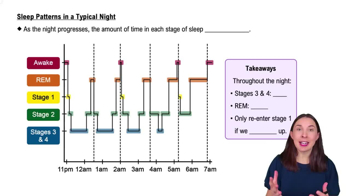Table of contents
- 1. Introduction to Psychology1h 43m
- 2. Psychology Research2h 20m
- 3. Biological Psychology2h 41m
- 4. Sensation and Perception28m
- 5. Consciousness and Sleep32m
- 6. Learning41m
- 7. Memory34m
- 8. Cognition37m
- 9. Emotion and Motivation35m
- 10. Developmental Psychology33m
- 11. Personality48m
- 12. Social Psychology41m
- 13. Stress and Health41m
- 14. Psychological Disorders44m
- 15. Treatment47m
5. Consciousness and Sleep
Sleep
Struggling with Psychology?
Join thousands of students who trust us to help them ace their exams!Watch the first videoMultiple Choice
Opium and its derivatives duplicate the action of
A
GABA.
B
insulin.
C
endorphins.
D
acetylcholine.
 Verified step by step guidance
Verified step by step guidance1
Begin by understanding the role of opium and its derivatives in the brain. These substances are known to interact with neurotransmitter systems.
Identify the neurotransmitter systems that opium and its derivatives affect. They primarily influence the opioid receptors in the brain.
Recognize that endorphins are natural neurotransmitters that bind to opioid receptors, similar to opium and its derivatives.
Understand that endorphins are involved in pain relief and pleasure, which is why opium and its derivatives can mimic their effects.
Conclude that opium and its derivatives duplicate the action of endorphins by binding to the same receptors and producing similar effects in the brain.

 3:25m
3:25mWatch next
Master Circadian Rhythms with a bite sized video explanation from Hannah Gordils
Start learningRelated Videos
Related Practice


































































































![Race, Genes and IQ Differences | Bret Weinstein [Mini Clip]](https://img.youtube.com/vi/IztL_m3pd70/mqdefault.jpg)



































































































